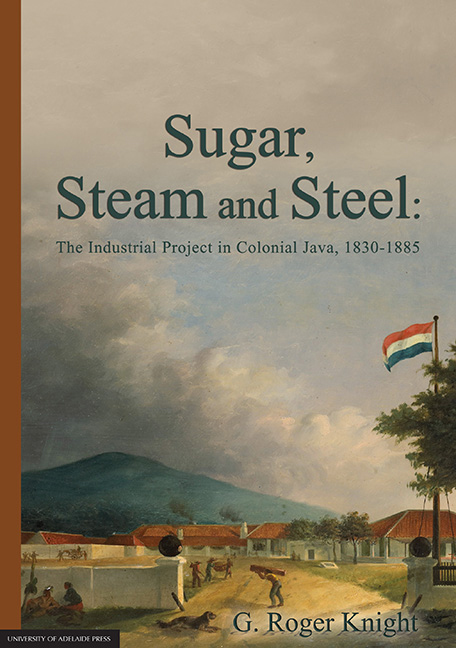Book contents
- Frontmatter
- Contents
- Abbreviations and Glossary
- Acknowledgements
- Introduction: Java Sugar, an Industrial Project and the ‘Oriental Cuba’, 1830-85
- Part I The ‘Industrial Revolution’ in Sugar Manufacture
- Part II The ‘Peasant’ Economy, the Money Trail and the Bourgeoisie
- 4 Sugar without Slaves: The Agrarian Basis for the Industrial Project
- 5 The Money Trail: State, Suikerlords and Bourgeoisie
- Part III Metamorphosis
- Conclusion: The Future of an Industrial Project: The 1880s and Beyond
- Archival Sources
- Bibliography
5 - The Money Trail: State, Suikerlords and Bourgeoisie
from Part II - The ‘Peasant’ Economy, the Money Trail and the Bourgeoisie
Published online by Cambridge University Press: 24 October 2017
- Frontmatter
- Contents
- Abbreviations and Glossary
- Acknowledgements
- Introduction: Java Sugar, an Industrial Project and the ‘Oriental Cuba’, 1830-85
- Part I The ‘Industrial Revolution’ in Sugar Manufacture
- Part II The ‘Peasant’ Economy, the Money Trail and the Bourgeoisie
- 4 Sugar without Slaves: The Agrarian Basis for the Industrial Project
- 5 The Money Trail: State, Suikerlords and Bourgeoisie
- Part III Metamorphosis
- Conclusion: The Future of an Industrial Project: The 1880s and Beyond
- Archival Sources
- Bibliography
Summary
In the mid-1880s, when most sugar manufacturers in Java were in extremis on account of a sudden and dramatic fall in world sugar prices, an apologist for the industry published a book in Amsterdam under the polyglot title of Suikerlords [Sugar lords]. It was a spirited defence of Java's sugar manufacturers and traders, whose purportedly profligate behaviour over the preceding years was widely blamed for the financial predicament in which they now found themselves. Yet the book was no mere polemic, since it drew on the author's extensive experience of the Indies over the preceding twenty or more years, and came from the pen of a man who was wellknown and respected in Dutch business circles. He had been the founder, a few years earlier, of the Koloniale Bank, an enterprise that became one of the major pillars of the Java sugar industry for the next half-century of its colonial-era existence. The title that Jan Hudig had chosen was deliberately ironic. Indeed, the whole point of his account was to establish the solid bourgeois rather than quasi-'Asiatic’ or seigniorial credentials of the Indies sugar manufacturers who had dominated the Java industry over the last few decades. It was to their formidable accumulation and investment of capital that he now he sought to draw attention (and to which we shall return later in the chapter).
Despite the efforts of Hudig (and, until recently, very few others), the colonial or 'Indies’ bourgeoisie of nineteenth-century Java have enjoyed a mixed history. Indeed, according to some accounts they scarcely figured at all. Rather, the bourgeoisie were judged to have been marginal to projects for large-scale commodity production in the colony, since such projects continued to be masterminded by the Indies state through the middle decades of the nineteenth century. This judgement is simply wrong. Between the 1840s and 1880s, Java sugar had been transformed (as we have seen) by an industrial project, grounded in the state's commandeering of land and labour and, initially, by the state's direct provision of finance. Contrary to some lingering notions about the dynamics of capital in Java in the mid-nineteenth century, however, this industrial project was closely linked to the spawning of a bourgeoisie, without whom it would scarcely have reached the stage of development that it did.
- Type
- Chapter
- Information
- Sugar, Steam and SteelThe Industrial Project in Colonial Java, 1830-1885, pp. 133 - 174Publisher: The University of Adelaide PressPrint publication year: 2015



